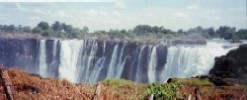
welcome to
SAfricaVoyage.com

|
| Home Articles Headlines Links Feedback Link to us Free update About us |
(Photo: A beached whale) Ajubatus (Ajubatus Marine and Wildlife Rescue) is now able to fulfil its obligations and maximise its dedication to the ecology of the region. Its new fixed site is in Cape St Francis, a tiny fishing village about 100kms south of Port Elizabeth on the East Coast. South Africa's Portnet gave permission in April this year for the project to go ahead. Ajubatus has already opened a coffee and curio shop in a house alongside the lighthouse, which is a national monument. Plus it is taking tourists up the this historic landmark, first established in 1878.
According to Colin Dyer, founder of Ajubatus, the centre will be an 'adventure land' which will become a major tourist attraction for the Greater St Francis region. The anticipated cost of the Ajubatus centre will be around R2million. To achieve this capital outlay Ajubatus is embarking on a series of fundraising events and hopes sponsorship will be forthcoming.
When concerned local residents were unable to solicit help from various quarters, a group of volunteers stepped in and decided to do the rescue themselves. And so it was that that the fledgling Ajubatus concept was born - initially operating as a capture and transfer service for needy animals. To date this voluntary organisation has amassed a huge stockpile of equipment, rescue vehicles, many volunteers and an ever-increasing membership base. Moreover its field of operation started stretching beyond Cape St Francis and St Francis Bay shores to Blue Horizon Bay in the north and the Tsitsikama in the south. The organisation is now becoming involved on a national scale.
Ajubatus has been rather busy over the first few months of this year. Of note were two seal rescues. A young Cape Fur seal, which had a large hook in its mouth, was rescued and relocated to Bayworld in Port Elizabeth where the hook was removed. Then a young pup Cape Fur, weak and thin, was rescued on the rocks at Cape St Francis.
For example to rescue four porcupines, two of which were captured after destroying beautifully manicured lawns on residential property! A Vervet monkey, a Civet and two Dassies (rock rabbits) were also captured after reports that these animals were frolicking in residential areas. There have
been numerous sightings of puff adders in Cape St Francis, particularly
along the rocks, and elsewhere in the region. Craig Urquhart of Ajubatus
says this is an exceptionally active time for snakes - just before their
hibernation period. "Ajubatus has a proud record of capture and release,
even of the venomous nasties!" he adds. Ajubatus is preparing for the cold and rough seas, gale force winds and drop in temperatures in the months ahead in the Eastern Cape, as this is the organisation's busiest time. It's when most of the callouts are for seals suffering from the ravages of the first winter storms. Another concern is turtles that wash up over the beaches during this period after being caught up in currents and washed down from the Natal coast. When found they are often exhausted and dehydrated and need extensive rehabilitation. It is hoped, with necessary funding that a turtle rehabilitation unit can be started at the proposed lighthouse base.
According to Colin, Ajubatus is concerned about the oceans but there is limited funding for research available in South Africa. "Marine mammals are prime indicators of the health of our oceans," says Dyer. "There appears to be an increase in stranding of these mammals, but statistics are sadly unavailable." Dyer believes that a more formalised approach to marine studies and preservation is necessary. There is also a need for specific protocols for capture, rehabilitation, release, data collection and sampling. "It is not practical to have small groups of conservationists working independently of one another. Information from all these groups should be pooled and shared and also centrally co-ordinated to assist scientific statistical analysis and to determine trends," Dyer adds.
|
Sponsored by: |
||||||||
|
| ||||||||||
| Link
to this site. Feedback. All contents copyright © 2001,2002, all rights reserved. 1:26 |
|
This site is hosted by Interprise. | ||||||||